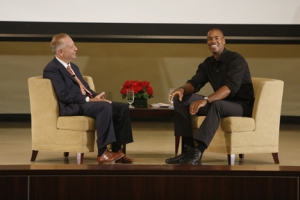By Sara Reeve
When NBA center Jason Collins came out as a gay man on the cover of Sports Illustrated magazine, he became a cultural icon — the first openly gay athlete playing a major American team sport.

During the first of the Dean’s Distinguished Lecture series, Keck School of Medicine Dean Carmen A. Puliafito, MD, MBA, interviews NBA player Jason Collins on his coming out as an openly gay athlete.
(Photo/Steve Cohn)
“I am definitely not alone,” said Collins. “Statistically speaking, there are [gay athletes] in all sports.”
In a wide-ranging discussion with Keck School of Medicine of USC Dean Carmen A. Puliafito, MD, MBA. Collins discussed his coming out process, a phone call with President Barack Obama, on being a role model and his future in the NBA.
Much of the free-form discussion, as part of the 2013-2014 Dean’s Distinguished Lecturer series held on Sept. 12 in the Mayer Auditorium, circled around the idea of stereotypes — of athletes, of African-Americans and of homosexuality.
“As physicians, we know that stereotyping is a very dangerous thing that can interfere with taking care of patients and ensuring their quality of care,” said Puliafito.
According to Collins, the fact that he is a gay male made him play a more physical style of basketball to fight certain stereotypes associated with gay men.
“As an athlete, you’re taught what it means to be a ‘tough guy,’” he said. “Being gay is considered to be the other side of the spectrum. People associate the worst stereotypes with being gay. … I always had a chip on my shoulder, and it was one of those things that just made me play harder.”
Collins ended the talk by answering a question from the audience about his toughest competitors, and turned his answer into a message about competing in the “right” way, and about the value of positive behavior, both on and off the court.
“I’m all for being physical, and playing hard, but you should never cross the line as far as how you conduct yourself on the court, in terms of what you say and what you do — you should never try to injure a player,” he said. “One thing my grandmother taught me and my brother at a very early age: your reputation will go places you will never go.”
An archived webcast of the discussion can be viewed online at http://keckmedia.usc.edu/Mediasite/Catalog/catalogs/ddls.
The conversation with Collins was the first in the 2013-2014 Dean’s Distinguished Lecturer series. Future speakers include David Kessler, MD, former chief of the U.S. Food and Drug Administration, and freelance journalist Owen Bennett-Jones.

